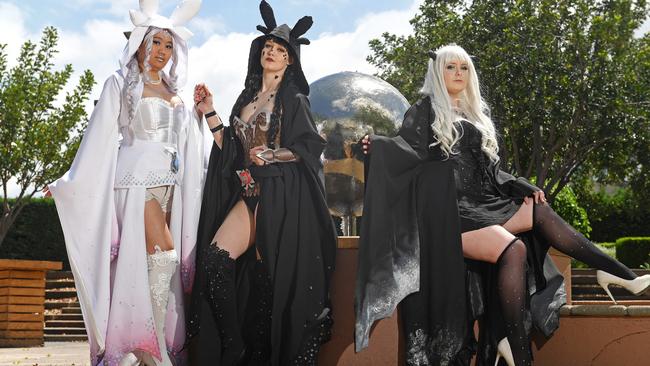Inside the Adelaide Crows experiment in esports
The Adelaide Crows are punting on a burgeoning new sport where the potential audience and prizemoney is massive. So why — and how – is the club moving into esports?
SA News
Don't miss out on the headlines from SA News. Followed categories will be added to My News.
- How internet addiction affects your child’s brain
- Are you getting the most from your Advertiser subscription?
Aussie Rules might be known as the biggest game in town but there are Australian esports tournaments, former Adelaide Crows player Nigel Smart points out, with much bigger audiences than the AFL.
“It’s hard for some people to understand that,” the three-time all-Australian player says.
And it is, in all probability, a serious undersell for the sport of competitive computer gaming.
Earlier this year, Melbourne teenager and gamer Anathan Pham and his team of five shared $23 million for winning an esports tournament, The International.
Last month, also in Melbourne, about 70,000 people headed along to PAX Australia, the biggest annual video gaming get-together in the southern hemisphere.
Social media shows colourfully costumed attendees, male more than female, heady and tribal but in a good way. Not many people there, it seems, are over 30.
Esports, as 2020 dawns, is big business.
Last year, 6.6 billion hours of esports – electronic sports for the uninitiated – were watched worldwide, with global competition prizemoney north of $US1.1 billion and climbing as if rocket-fuelled.
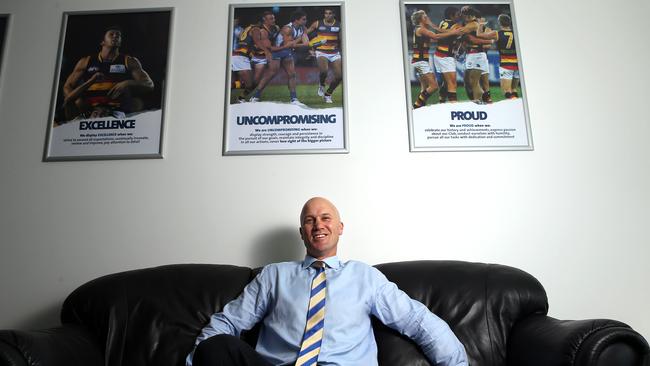
This year’s League of Legends world final alone had a global audience of 70 million.
By comparison, the AFL Grand Final had 2.2 million capital city TV viewers, and Smart concedes esports now “dwarfs” footy.
Broadcast – whether TV or online – is the driver. More people watched the 2016 League of Legends Season 3 World Championship broadcast on Twitch than followed the 2017 Super Bowl.
It’s the sort of business you wish you’d got into a couple of years ago – which Smart, the Crows’ chief operating officer, did in 2017. A few years after the club’s shift to the Adelaide Oval, Smart looked at its finances.
The club’s biggest three areas of revenue – membership and ticketing, corporate hospitality and broadcast – were well explored (yielding revenue of $56 million in 2018) but the Adelaide Oval, like all venues, had its limits.
“What was the growth area? What do we do if the football performance suffers?” Smart asked. “We looked at risk and what revenue streams there are to bring money back into the club.” Intriguingly for an industry historically very inward looking, he looked at the bigger picture, with a trawl of the esports world yielding instant results.
“There was evidence from overseas that it was growing, but our understanding of it was somewhat limited. We started to look at how it all worked,” he says.
Astonishingly, perhaps to anyone beyond this current e-generation, esports has been touted as a demonstration sport for the 2024 Olympics. As Smart discovered, it is happening.
“Gaming is a large stream and within the stream you have certain games that people are watching,” Smart says.
“Clubs need to be aware of (such) competition and ask how we engage young people. Gaming gives us that understanding.”
The search came up with a four-person, Australian e-team called Legacy. Its 2017 acquisition by the Crows was about understanding the domestic esports landscape, Smart says.
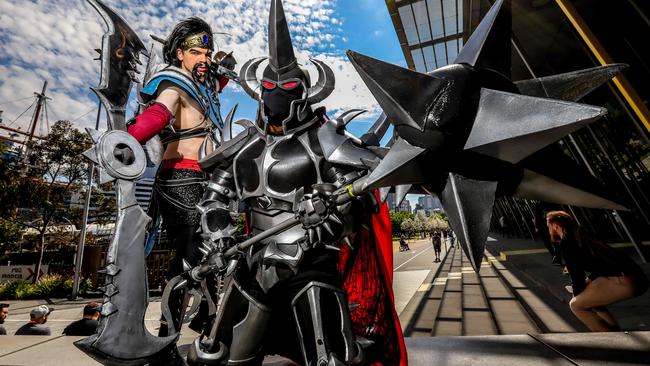
Legacy was an interesting set-up. Owned by its four founding partners, it was best known for its prowess in the popular five man e-game League of Legends.
“They were friends who came together through League of Legends,” Smart says. “They were very good. They were at the end of their time and moving on. They were not playing anymore.”
It was an ideal match – the Crows’ purchase of the IP (intellectual property) and brand gave it a way in and a way to grow. The name Legacy was consciously retained.
“We wanted to be authentic, they had their own fans,” Smart, pictured above right, says.
The Crows are not alone in top-flight sporting clubs buying into esports. The Qatar-originated City Football Group, which owns Manchester City and Melbourne City, is on board as is European soccer powerhouse Paris Saint-Germain. Major American basketball clubs are taking a stake, too. NBA club Golden State Warriors has created its own League of Legends team while, closer to home, Essendon Football Club also has its own League of Legends team, Abyss.
Despite his focus on expanding esports, Smart is adamant this is an addition to the club brand only and, pivotally, an addition to bolster finances and football.
“We will always put money back into the football program. The core of the club is always the most important to us,” he says.
“With all that has happened over the last month (new coach and players departing) people don’t understand why we are working with an e-team.
“There is no interest, only football matters to them.
“We’re not taking resources away from the football. We structured this to how we are as a football club.”
Shortly after Legacy came on board, Riot Games, the maker of League of Legends, was approached and, in 2018, a state-based teams competition, the META High School Esports League, was set up.
In year one, League of Legends was the sole game on offer yet 70 teams signed up. Year two brought 308 teams with 2500 students from across Australia and New Zealand playing three games. The esport leagues have two seasons a year, attracting up to 15,000 viewers.
There is no prizemoney but professional players are paid $20,000 to $80,000 a year.
Winning teams then compete in national tournaments where the big money is to be won.
Legacy players compete in a variety of games – League of Legends; Counter-Strike: Global Offensive; Rocket League; Smite; Starcraft II; and Super Smash Bros.
Partnerships with Intel and Optus have blossomed for Legacy while Torrens University is also onboard for the META high schools tournament.
“Partners are wanting to engage. They see the team represents young people who are digital-savvy. It has also allowed us to invest in new partnerships,” Smart says.
That Legacy is an addendum to the Crows’ historical focus – click on the club’s home page and Legacy is absent – comes with perception.
“We are running it all as a start-up. We will keep adding employees. I am hoping it will be a significant revenue stream,” Smart says.
Plans are growing all the time, with another game in the mix for 2020 and overseas competition being sought.
This year, a team playing Fortnite – a hugely popular shoot ’ em up game – was dispatched to New York to play a tournament.
“We housed them in New York for five weeks and they (the three players) won $60,000,” Smart says. A European campaign is now under consideration.
Who might make the grade or not has surprising comparisons with footy recruiting.
“We look for young men and women who have passion. Our job is to support them in schooling, training and psychological support if needed,” he says.
Recruitment is done the AFL way: identify, interview, then test and contract if unattached.
Legacy keeps a regular eye on its players. There is a fraternity-type house for players at West Lakes and in Sydney.
It makes the mind boggle, but the Crows run both. A duty of care, as per AFL recruits, is in place, too. This is no small-scale operation.
“We will probably start to build up education requirements they need to know about, like betting in esports and compliance, risks. We are being quite proactive in that particular space.”
However, not everyone is one board just yet. Preaching the e-message, even in-house, can be tough.
“We have capability across many areas to help support esports,” Smart says. “It can be challenging for staff to understand it if they don’t play the same games.”
The Fan - Joshua Malin
The roar of the crowd after an impossible play, the feeling of relief after a last-minute comeback, the pride of seeing your favourite player get one over on their rival.
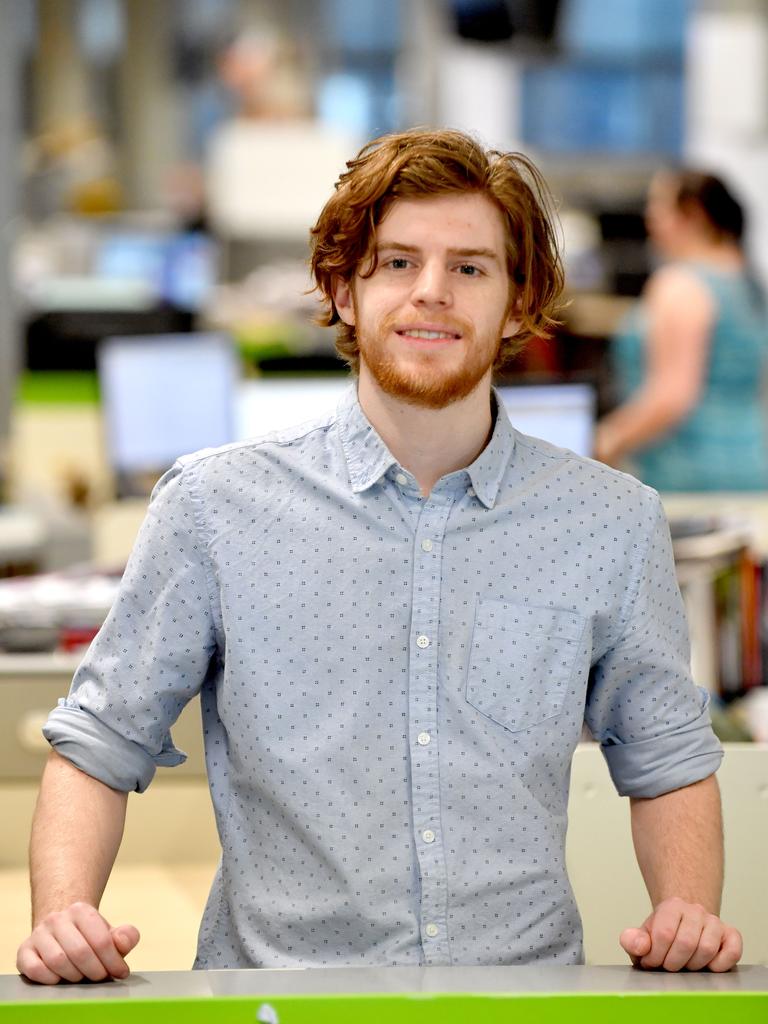
These are some of the moments that keep me coming back to esports. If you’re an avid fan of traditional sports, you might notice a few similarities between your sport of choice and mine.
Obviously, there are some differences – a distinct lack of muscle, sun tan and social skills often separates the gamers from the athletes.
While they might not compare physically, they actually have a lot in common when it comes to their love for the contest and dedication.
Their physique might not show the results of their training but to be among the best in the world at a game such as Fortnite, with up to 250 million registered players, you cannot be your stereotypical lazy gamer. The greatest players in the world hold that position because they treat practice like a full-time job.
As someone who falls more on the lazy gamer side of the spectrum, there is an appreciation of just how difficult it is to be the best.
From my experience this is a big reason people get into esports – to see ordinary people compete with each other at the highest level.
When you watch an AFL ruckman in action, as impressive as it may be, it can be hard to relate to a player who was genetically gifted enough to always tower over his opponents.
When you watch a team win a hard-fought game of League of Legends, you know the winning team was the one that showed the best teamwork, strategy and execution.
When you get rid of any physical advantages, you get to see which team worked the hardest and played the smartest.
My introduction to esports was through a game called Dota 2 in 2013. At the time, I was a casual player and knew nothing of its competitive scene.
This was until a team called Na’Vi went viral online for its performance in a global tournament called The International. The reason for their sudden popularity was a never-before-seen technique called “the Fountain Hook” – using two characters in perfect synergy to pull the enemy into their base and destroy them. The strategy was patched out of the game shortly after for being deemed unfair – but not before Na’Vi became the most well-known team in Dota 2.
A common way to tune in to these events is through streaming site Twitch.tv, where you can watch the games for free and participate in a live chat with others watching around the world.
For the uninitiated, it can be quite daunting to come into this environment without understanding all the references and inside jokes, but this doesn’t have to stop people from getting involved.
In large tournaments, the live chat will quickly devolve into mindless spamming but, similar to stadium sporting events, the content of the cheers and chants isn’t what’s important, it’s the energy.
While the competition might be what draws people to esports, I believe the community is what makes people want to stay.
There may be a perception of gamers being lonely shut-ins but esports are an opportunity for people to rally around the games they love, support their favourite teams, and interact with other like-minded people who might have never crossed paths otherwise.
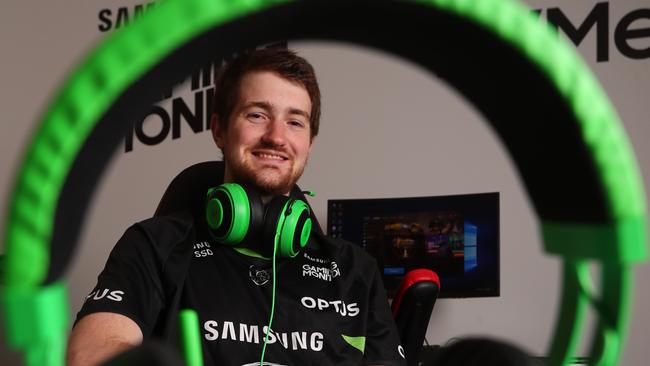
The Player - Dylan O’Mallon
In Year 10 at Glenunga High School, Dylan O’Mallon was doodling on a notepad and eventually came up with the moniker FroStee. There was no particular reason behind it, he says, but it stuck.
Today, the 25-year-old gamer is known to his thousands of social media and community followers by his pseudonym only.
It is wholly understandable and wholly fascinating, too.
FroStee lives with some mates and his two miniature schnauzers at West Lakes. He has a girlfriend and rides a Suzuki 650cc bike. He is also a black-belt with a third dan in taekwondo and teaches adults and children.
His parents are supportive of his career as a professional sports gamer but, from time to time, he says, his mum asks, “When I’m going to get a proper job?”.
His fan base says he already has it. For the past five years, FroStee has played the esports game Hearthstone so successfully that he is now Australia’s sole grand master in this field and has represented us abroad – Hawaii and South Korea are two recent trips.
He is also Legacy’s star player with much of his gaming done from the Adelaide Crows’ esports HQ, an anonymous, out-of-the-way darkened first floor room replete with monitors and little else but the showcase of the burgeoning Legacy empire.
And, he says, 10,000 to 15,000 people usually watch his games online. Like all things worthwhile, success has not come easily. A couple of years ago he was working in IT on the new Royal Adelaide Hospital. He was approached by Legacy this year when he was scratching around for a major sponsor.
“It has been a rocky road, for the most part,” Dylan says.
“When push comes to shove, I want to make this work. I finally got what I wanted in the first place; it just happened to be a place where I live, as well.”
He will be familiar with the famous rule associated with pop psych writer Malcolm Gladwell which holds that 10,000 hours of deliberate practice are needed to become world-class in any field. Dylan has exceeded this many times over.
“Sometimes, I would play for 16 hours and go to bed; sometimes I would wake up and play for 20 hours,” he says of his early days.
“Recently, I have found that it started to be a grind and I have cut back. You can burn out, so you have to be smart about it.”
Hence the taekwondo, a welcome and necessary release, he says. The fame is also a double-edged sword – although positive through and through.
“It’s like I live a dual life,” Dylan says. “I walk around West Lakes shops like anyone else but when I go to a tournament I’m really well known.”
He has an ambition that extends beyond the personal and which, paradoxically, reveals the speed of change within esports and technology at large.
“Older generations grew up playing sport, while newer generation grew up playing (electronic) games,” he says.
“It’s become mainstream now. My mum plays video games, so it’s a bit of a paradigm shift. I really want to try and promote esports to help make a better opportunity for kids today, an opportunity my generation didn’t have.”
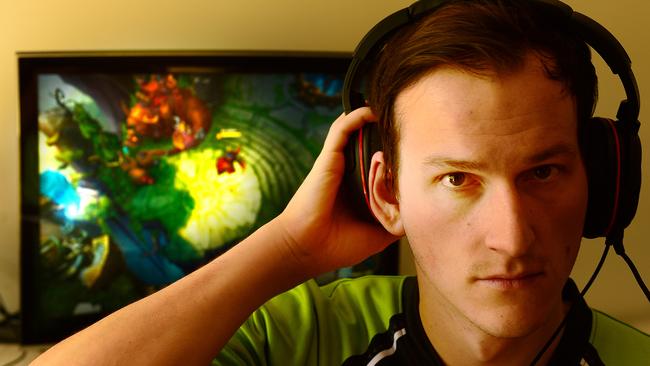
The Boss - Tim Wendell
Unusually among gamers, Adelaide Football Club head of esports Tim “Carbon” Wendel is a serious AFL follower.
“A massive Crows fan,” says his boss, Nigel Smart, of the Sydney-based but SA-born 27-year-old.
“I love it,” says Tim. “I’ve played video games 10 hours a day and this is the opportunity to work in something similar.
“I want to provide an opportunity to kids nowadays that were not there in my day.”
The former captain of Legacy’s successful League of Legends team which competed in the Oceanic Pro League (the US, Europe and Asia-Pacific are esports’ three big arenas), he helped set it up in 2014, as its oldest player.
This came after they won the second ever national League of Legends tournament.
“We just happened to win and then represented Australia. We needed a name to play with and decided on Legacy,” Tim says.
While Legacy is a Crows investment vehicle, Tim is emphatic they have an Oceanic outlook.
“We have players from New Zealand. The lion’s share are from Australia but from all over the country so they’re not all Crows fans,” he says.
Indeed, keeping tabs on the team is no easy task. Between 20 and 40 players represent Legacy annually, with season-end status ushering in a Hunger Games-like scenario as players who have not made the cut bid adieu.
“Some players in Sydney all live together and also in Adelaide. There are players who will play remotely from their home or their parents’ (home). Not all events require you to be on a stage.”
Tim says keeping the Legacy name was not part of the deal, but made the most sense.
“We already had a bit of a fan base, so the club didn’t want to pigeonhole itself in SA. You can make enemies that way,” he says.
Tim says defining just what esports is about can be a challenge for the non-follower.
“Esports is like a muti-discipline sporting club that might have basketball, tennis and football all under the same banner,” he says.
“Every esport is different and has different requirements. We have a LoL team – five players and a coach – and there’s also an Academy team for LoL.”
The popular games change every year, Tim says – with Fortnite coming out of the blue.
“It creates an opportunity – we picked up four Fortnite players. We might let these four players go, we might pick up a team for another program,” he says.
A Fortnite tournament this year at Margaret Court Arena in Melbourne – on the day of the Australian Open men’s finals – was headed by DrLupo, who has 2.8 million followers on the gaming streaming service Twitch, and offered $500,000 in prizemoney.
Player recruitment is a major responsibility for Tim, who also oversees partnerships and publishing.
“We watch tape of players competing, watch their performances, before a decision is made on who plays,” he says,
Smart says who might make the grade or not has comparisons with footy in terms of recruiting.
“There are different characters and needs; we do it on an as needs basis,” he says.
While esports is growing exponentially globally, Australia is still a bit behind the rest of the world, Tim says.
“We have a lot of challenges – geographical size, small population, infrastructure,” he says.
A comparison might be drawn between the domestic soccer
A-League and the English Premier League, he says, which dominates even in Australia.
Tim has no doubt esports and its audience will continue to thrive in Australia. Quite simply, the passion is here.
“In general, people who play games are always happy to watch people play who are doing it really well,” he says.
The Spawn Point - Jeeves Dunn & Unley High
Jeeves Dunn was a bit nerdy as a child and eventually turned to video games and competitions.
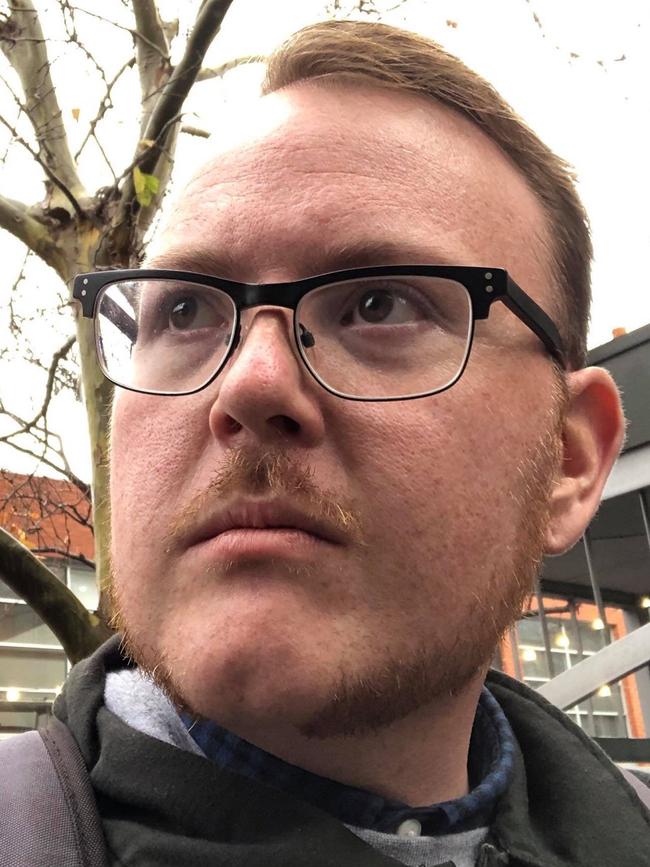
“My Dad used to ask me what I had won at the weekend,” he says, a giant boost to his self-esteem coming with every parental inquiry.
He was good, seriously so, being in the top 10 nationally for a game called Quake.
Now chaplain at Unley High School, Jeeves was the perfect fit to oversee the school’s newly formed esports team last year.
“The club is a big positive. The students who compete are like athletes or rowers who are good at sports and are good at academia,” he says.
“You can tie it back to this. It helps hugely and can get you through high school.”
It began innocuously as three students – Aidan “MudNoodle” Dean, Josh “Joshortex” Cudmore and Aiden “delusioN” Hendry – wanting to join the national high schools esports league set up by Legacy. Jeeves was on board in a flash.
“They set up a club, Discord. It makes sense for students who did not necessarily fit in anywhere else or were not sports-oriented and wanted to learn and grow within a community,” he says.
“They are A-grade students. delusioN is one of the best players in the country, and he has played for Legacy. Josh was man of the match at the esports Melbourne Open final on August 1.”
Jeeves insists the group is not simply a video-gaming club.
“This is an esports club. I love video games, you play video games on your mobile,” he says.
“Esports is an organised sport, you pick a team.”
Unless High School plays the three-on-three player game Rocket League – very well, in fact.
With Jeeves’s guidance, the club is already a two-time national Rocket League champion.
The state season runs from March to August and the national season runs from August to September, to finish in time for end-of-year exams.
All year levels – male and female – can play.
Young teachers are in a position to engage with students for great outcomes, says Jeeves. Learning how to lose is a major benefit – “one of the biggest things” – as is having something to believe in, a real passion.
“Unley High winning the Rocket League national title is no different for us than playing the national championships in cricket. The players are very proud of it,” he says.

